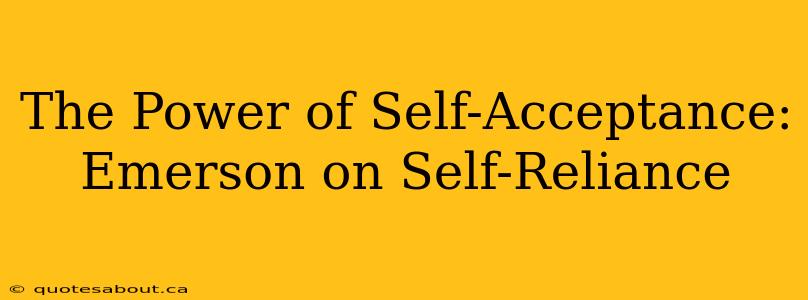The Power of Self-Acceptance: Emerson on Self-Reliance
Ralph Waldo Emerson's essay, "Self-Reliance," remains a cornerstone of American Transcendentalism and a timeless guide to personal growth. More than just a call to individual action, it's a powerful exploration of self-acceptance as the bedrock of a fulfilling life. Emerson argues that genuine self-reliance stems not from arrogance, but from a deep understanding and acceptance of one's unique self, flaws and all. This acceptance allows for authentic living and the pursuit of one's truest potential.
What is self-reliance according to Emerson?
Emerson's concept of self-reliance isn't about isolation or disregard for others. Instead, it's about trusting your own intuition and judgment, even when it differs from societal norms. It's about recognizing your inherent worth and acting in accordance with your conscience, rather than conforming to external pressures. This necessitates a profound acceptance of your individuality – embracing your strengths and weaknesses without self-judgment. He encourages readers to trust their inner voice, which he believes is divinely inspired and uniquely personal. This trust forms the foundation of true self-reliance.
How does Emerson’s concept of self-reliance relate to self-acceptance?
Self-acceptance is the crucial first step towards Emersonian self-reliance. Without accepting yourself – your unique talents, your limitations, and your imperfections – you cannot truly rely on your own judgment. Self-doubt and a constant striving for external validation prevent genuine self-reliance. Emerson emphasizes that societal pressures often lead to conformity, stifling individual expression and hindering the development of one's unique potential. By accepting who you are, you free yourself from this pressure, allowing your authentic self to shine.
What are the benefits of self-acceptance according to Emerson?
Emerson believed that self-acceptance unlocks several key benefits:
- Increased Authenticity: Embracing your true self allows you to live more authentically, aligning your actions with your beliefs and values. This leads to a greater sense of purpose and fulfillment.
- Enhanced Creativity: Self-acceptance fosters self-confidence, allowing for greater creativity and risk-taking. When you are not constantly striving to meet external expectations, you are free to explore your potential and express your unique perspective.
- Greater Independence: True self-reliance, built upon self-acceptance, allows for greater independence from societal pressures and the opinions of others. You are less susceptible to external validation and more capable of making independent decisions.
- Stronger Moral Compass: By trusting your own intuition and accepting your inner voice, you develop a stronger sense of morality, guided by your own conscience rather than external rules.
Is self-reliance the same as selfishness according to Emerson?
No, Emerson explicitly rejects the idea that self-reliance equates to selfishness. He argues that true self-reliance is inherently intertwined with a deep understanding and appreciation for humanity. While you should trust your own judgment, this doesn't necessitate ignoring the needs of others. In fact, Emerson believed that only by being true to oneself can one truly connect with and serve others in a meaningful way. Authenticity, stemming from self-acceptance, paves the way for genuine human connection.
How can I achieve self-acceptance and self-reliance?
The path to self-acceptance and self-reliance is a journey, not a destination. It requires conscious effort and self-reflection:
- Self-Reflection: Take time for introspection. Journaling, meditation, or simply quiet contemplation can help you gain a better understanding of your strengths, weaknesses, and values.
- Challenge Negative Self-Talk: Identify and challenge negative thoughts and beliefs about yourself. Replace self-criticism with self-compassion.
- Embrace Imperfection: Acknowledge that you are not perfect and that's okay. Embrace your imperfections as part of what makes you unique.
- Set Boundaries: Learn to set healthy boundaries to protect your time and energy from external pressures.
- Live Authentically: Align your actions with your values and beliefs, even when it's difficult.
Emerson's "Self-Reliance" remains profoundly relevant today. In a world that often values conformity over individuality, his message of self-acceptance as a pathway to a fulfilling and authentic life is more important than ever. By embracing our unique selves, flaws and all, we unlock the true power of self-reliance.

